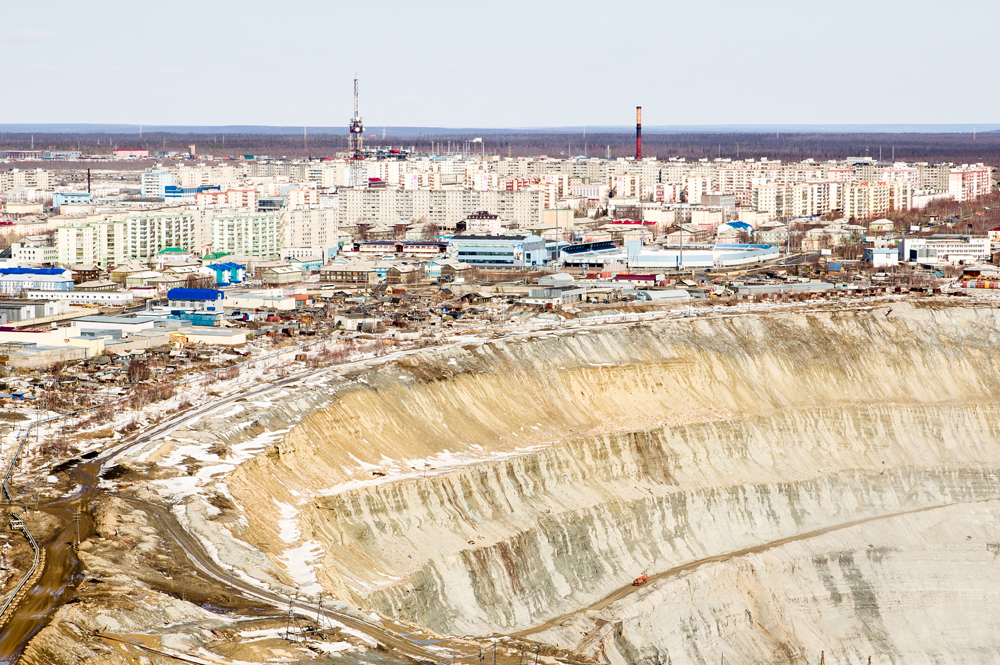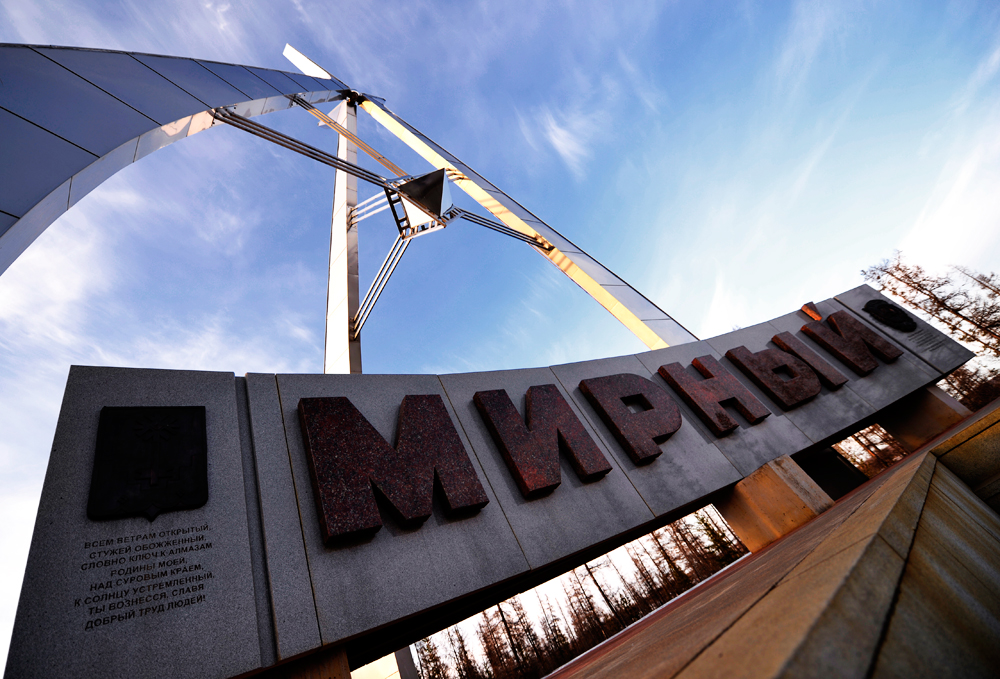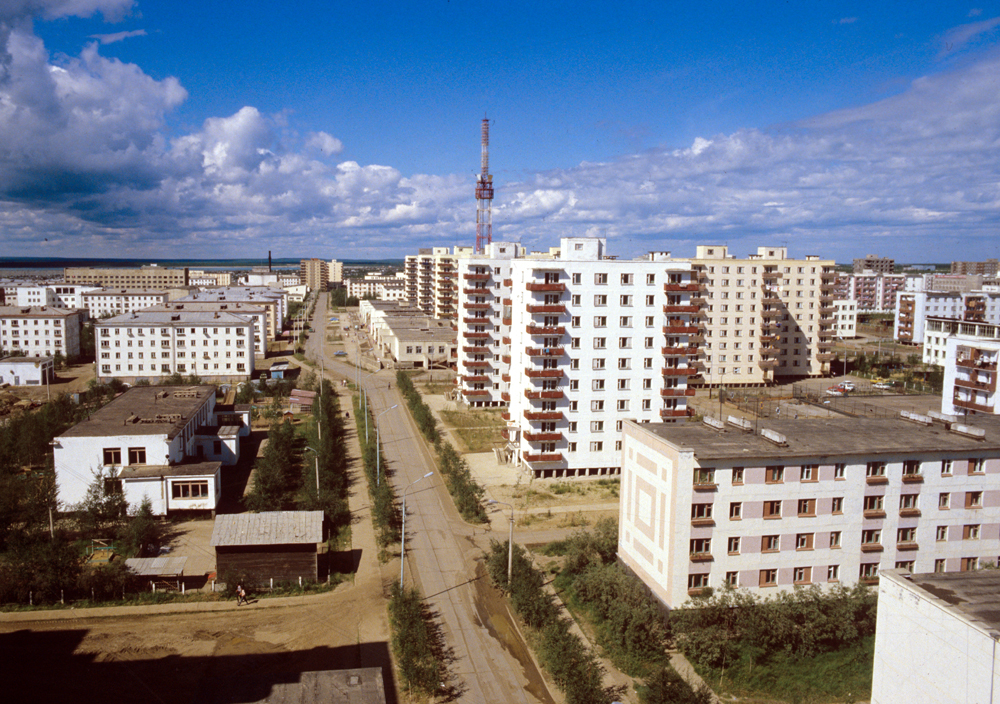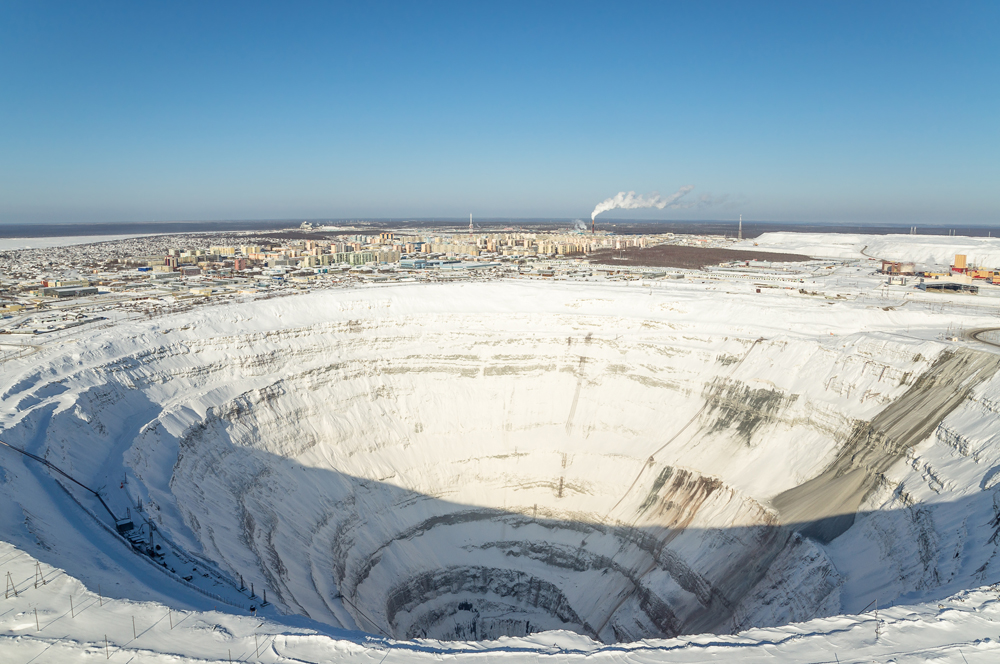
Mirny, Sakha Republic
Lori/Legion Media According to one legend, the diamond reserves of Yakutia appeared when God, flying over the region, got so cold that his hands went numb, and he dropped the treasure he was carrying; this treasure became the gold, precious stones and diamonds Yakutia now prides itself on. Source: Yuri Smityuk/TASS
According to one legend, the diamond reserves of Yakutia appeared when God, flying over the region, got so cold that his hands went numb, and he dropped the treasure he was carrying; this treasure became the gold, precious stones and diamonds Yakutia now prides itself on. Source: Yuri Smityuk/TASS
The city of Mirny, located in one of Russia’s coldest and most remote regions, exists for one reason and one reason only – diamonds. Indeed, the place owns its very name to the giant pit on the periphery of the town: the Mir (“Peace”) diamond mine, located on one of the world's richest diamond deposits.
Mirny (Russian for 'peaceful') was built in the 1950s, growing around a diamond mining operation started by the Soviet government after several rich diamond fields were discovered in the Siberian republic of Yakutia, located above the Arctic Circle some 5,280 miles east of Moscow, with winter temperatures going as low as -94° F.
Mirny is a typical example of what the Russians call a monogorod – a city dominated by a single company. Most of Mirny’s 35,000 residents work in the mine, which now belongs to Alrosa, the world's largest diamond miner.
Aytalina (all names changed) was born and raised in Yakutsk, capital of Yakutia. She and her husband moved to Mirny eight years ago after he was offered a senior position in the mining company. The couple have two children.
 Soviet Premier Nikita Khrushchev once made a comment about the diamonds of Yakutia: “It is time we show the capitalist aggressors what's what,” he said. “As soon as we begin extracting diamonds from the newly discovered deposits of Yakutia, our country will become a leader on the global currency market and will be able to promptly create a solid economic and technical foundation to build a communist society in the USSR.” Source: Nikolai Zaytsev/RIA Novosti
Soviet Premier Nikita Khrushchev once made a comment about the diamonds of Yakutia: “It is time we show the capitalist aggressors what's what,” he said. “As soon as we begin extracting diamonds from the newly discovered deposits of Yakutia, our country will become a leader on the global currency market and will be able to promptly create a solid economic and technical foundation to build a communist society in the USSR.” Source: Nikolai Zaytsev/RIA Novosti
“When I married Gennady and we started getting ready to move, I thought I'd be swimming in diamonds,” she says, laughing. “Naturally, my husband was quick to explain that all the diamonds belong to the state and the mining process is strictly supervised – leaving the mine with a diamond in your pocket is impossible.”
“Mirny is much smaller than Yakutsk, but I would never go back, not for love or money,' says Aytalina, who works as a manager at a store.
“Mirny is a great place for a young family: The town is surrounded by clean taiga forests, there are rivers and lakes around, and we make just enough for our kids to have all they could ever need. Yakutsk, on the other hand, is crowded and dirty.”
 The airspace above the mine is off-limits to helicopters: The giant pit, 1,722 feet deep and 3,900 across, creates a downward air flow, sucking in any aircraft that happen to fly low enough. Source: Lori / Legion Media
The airspace above the mine is off-limits to helicopters: The giant pit, 1,722 feet deep and 3,900 across, creates a downward air flow, sucking in any aircraft that happen to fly low enough. Source: Lori / Legion Media
The family's income is high, so they can afford both shopping and going on regular trips out of town, says Aytalina, and the latter is made even easier as there is an airfield in Mirny. She believes the town's citizens are open-minded and tolerant.
“Back in Yakutsk, my husband was often harassed because of his Russian ethnicity; I also got my fair share of accusations for marrying a Russian man, since I'm Yakut.
“Nothing of the sort ever happens here, since half of the town's population are Russians who work for the mining company. People in Mirny care about how you do your job, not about who you are ethnically.”
Still, some of Mirny's residents say living here is not at all easy. At first glance, Olga and Khotoy's family seems just like Aytalina's: They moved to Mirny 10 years ago, they have two children, Khotoy works in the mining company, while Olga is a schoolteacher.
But that's where the similarities end: Olga and Khotoy are struggling to make ends meet – they live in what amounts to a wooden shed and haven't been able to afford to go anywhere on vacation for several years now. Olga says this inequality is created by the diamond mining company.
“My husband has been working in the diamond mine for many years,” she says, “but his salary is still low, and the company offers no opportunity to advance. Moreover, they're saving money at the expense of their own employees: They're constantly revoking benefits, and if you dare complain, they could just fire you on the spot.”
 They say that anyone who reaches the bottom of the mine becomes dizzy, while coming back up can provoke a feeling of euphoria. The mine, resembling a bottomless pit, does look both beckoning and mesmerizing. Some people say their dream is to make a parachute jump from the edge of the quarry. Source: Lori / Legion Media
They say that anyone who reaches the bottom of the mine becomes dizzy, while coming back up can provoke a feeling of euphoria. The mine, resembling a bottomless pit, does look both beckoning and mesmerizing. Some people say their dream is to make a parachute jump from the edge of the quarry. Source: Lori / Legion Media
The fact that the local food prices are high doesn't help: “Food is incredibly expensive here,” Olga laments, “to say nothing of its quality, which isn't great.”
And travel isn’t cheap, either: 'I'd love to book a flight to Moscow to visit my family, or to go to a seaside resort with my kids,” says Olga, “but we can't afford that. The tickets are just too expensive.”
According to Olga, Mirny lacks skilled personnel other that those involved in the mining industry – there are virtually no good doctors or teachers. This problem could be solved by attracting people from other regions, but Olga says this is not an option at the moment.
“Aside from the jobs in the mine, the salaries here are low, especially if you work for the state – I make 19,000 rubles (about $300) a month, and with these prices, this is a pittance. Who would want to come here, then?” she says.
All rights reserved by Rossiyskaya Gazeta.
Subscribe
to our newsletter!
Get the week's best stories straight to your inbox